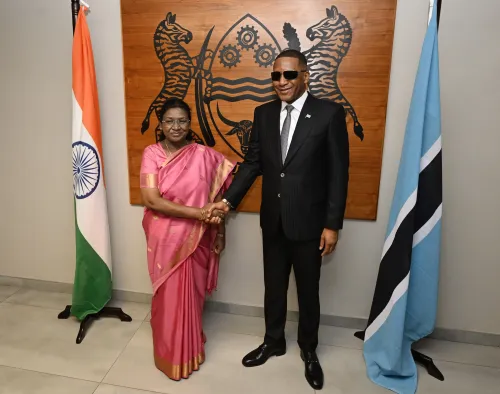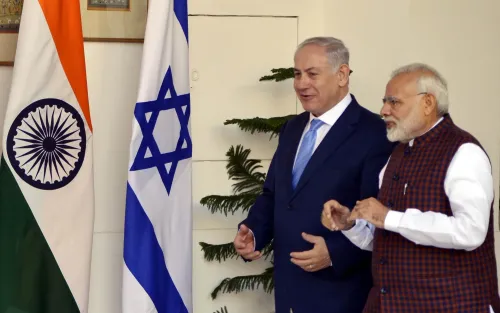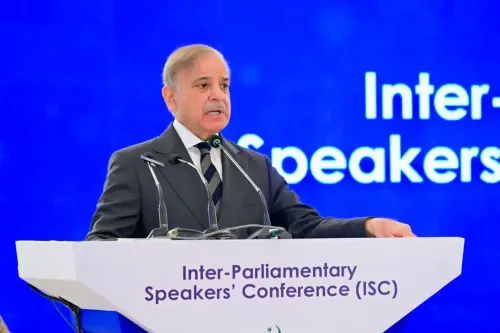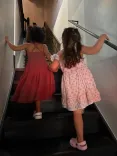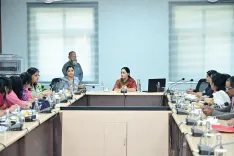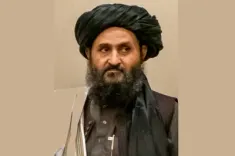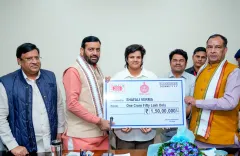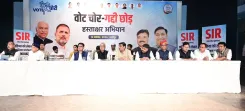Is India Really the 'Mother of Democracy' as Botswana's President Claims?
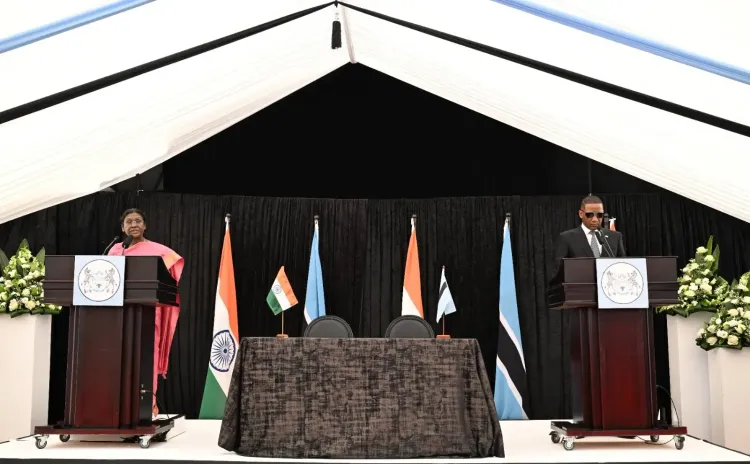
Synopsis
Key Takeaways
- India is celebrated as the 'mother of democracy' by Botswana's President.
- The visit marks the first-ever Presidential engagement between India and Botswana.
- Both leaders discussed expanding cooperation in vital sectors.
- India will support Botswana in wildlife conservation through Project Cheetah.
- The signing of agreements aims to ensure access to quality medicines for Botswana.
Gaborone, Nov 12 (NationPress) Botswana's President, Advocate Duma Gideon Boko, praised India as the “mother of democracy”, emphasizing that New Delhi has consistently been a reliable source of inspiration and support in the developmental trajectory of the African nation.
While welcoming President Droupadi Murmu to Gaborone, Boko commended her proactive efforts in advocating for education, gender equality, and the advancement of marginalized communities. He remarked that this marks the first State Visit hosted by Botswana since he took office last year, underscoring the significance of the bilateral relationship with India.
Both leaders engaged in extensive one-on-one discussions and delegation-level meetings, reaching an agreement to enhance collaboration across pivotal sectors such as trade and investment, agriculture, renewable energy, health, education, skill development, defence, and digital technology.
President Murmu conveyed that this visit signifies an important milestone for bilateral relations, being the inaugural Presidential visit from India to Botswana. This event holds particular significance as the two countries approach the 60th anniversary of their diplomatic ties in 2026.
She affirmed that India is dedicated to working closely with Botswana to further strengthen their partnership and to broaden its engagement with Africa, particularly in the context of the India-Africa Forum Summit.
"The President expressed her satisfaction in noting that Botswana will assist in reintroducing Cheetahs to India as part of the next phase of ‘Project Cheetah’. This initiative aims to restore the Cheetah population to India’s ecosystems. She extended her gratitude to President Boko and the people of Botswana for their willingness to send Cheetahs to India," a statement from the President's Secretariat detailed.
"The two leaders oversaw the signing of an agreement on pharmacopoeia aimed at ensuring accessible, high-quality, and affordable Indian medicines for the citizens of Botswana. The President also announced India's commitment to supply essential ARV medicines, as requested by the Botswana government," it mentioned.
In a sign of goodwill, President Boko personally welcomed his Indian counterpart at the airport, where she received a ceremonial welcome and guard of honor upon her arrival from Angola late Tuesday evening.
Throughout her visit, President Murmu is also set to address the National Assembly of Botswana, engage with the Indian community, and visit culturally and historically significant sites.
"Botswana's Vision 2036 document outlines its strategy to diversify its economy and evolve into a high-income society. This visit provides an opportunity to understand their priorities and explore potential partnerships between the Indian business community and their Botswana counterparts in identified sectors. We are also in discussions with Botswana regarding the translocation of Cheetahs to India under Project Cheetah, anticipating positive developments in this area," stated MEA's Secretary (Economic Relations) Sudhakar Dalela prior to the President's visit.
President Murmu arrived in Gaborone late Tuesday as part of her State Visit to Angola and Botswana, marking the first-ever Presidential visit from India to Botswana. She is accompanied by Minister of State for Jal Shakti and Railways, V Somanna, along with Members of Parliament Parbhubhai Nagarbhai Vasava and D K Aruna.
During this visit, President Murmu took part in the 50th anniversary celebration of Angola's Independence Day, addressed the National Assembly of Angola, interacted with the Indian community, and held discussions with her Angolan counterpart Joao Manuel Goncalves Lourenco.


